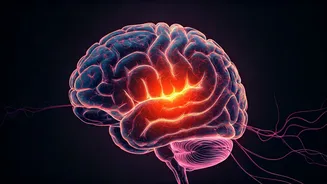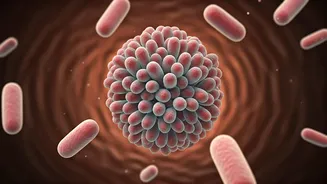Anxiety's Dual Nature
Anxiety, a condition both neurological and hormonal, is increasingly understood as a rewiring issue. Doctors are now shifting from viewing anxiety as an abstract
emotion to recognizing it as a problem of brain function that can be addressed through various interventions. The core concept is that the anxious brain isn't broken but is attempting to protect the individual. With the correct tools and approaches, this protective mechanism can be re-trained to achieve calm. This perspective emphasizes a shift in focus from mere symptom management to addressing the root causes within the brain's circuitry and hormonal balance. This shift has opened doors to more comprehensive and empathetic care. The 'threat brain' and the 'thinking brain', when out of balance, can cause chronic alertness with tense muscles, a racing heart, and intrusive thoughts.
The Brain's Alarm System
Within the brain, specific regions play critical roles in managing fear and emotion. The amygdala, acting as the brain's alarm system, activates the fight-or-flight response when it perceives danger. The prefrontal cortex, responsible for rational thinking, usually counteracts the amygdala's actions. However, when this control weakens, fear signals go unchecked. This interaction is key to understanding the physiological experience of anxiety. The overactive amygdala and the struggling prefrontal cortex contribute to the physical symptoms and the mental experience of anxiety. Understanding this interaction provides insights into the targets for potential therapeutic interventions. When there is a mismatch between the amygdala and prefrontal cortex, it keeps the body in a state of chronic alertness.
Gut-Brain Connection
The gut-brain axis, facilitated by the vagus nerve, is another significant player. Imbalances in gut bacteria can send 'bad signals' that activate the amygdala, contributing to anxiety. This helps explain why anxiety often manifests with physical sensations like nausea or stomach discomfort. The gut, where about 90% of the feel-good neurotransmitter serotonin is produced, plays a crucial role. Alterations in gut microbiota can impact serotonin and dopamine levels, affecting mood and anxiety. Understanding the gut-brain connection is crucial for comprehensive anxiety management. Interventions addressing the gut microbiome could potentially alleviate anxiety symptoms. The gut's influence on the brain shows the importance of lifestyle interventions like diet and gut health.
Brain's Plasticity Unveiled
The brain isn't static; chronic anxiety can reshape its structure. Prolonged exposure to stress hormones like cortisol can reduce the volume of the hippocampus, increase amygdala activity, and hinder prefrontal control. However, the brain's neuroplasticity – its ability to reorganize itself – means recovery is possible. Therapies like cognitive-behavioral therapy, mindfulness, and regular physical activity help restore the connection between the prefrontal cortex and the amygdala. This approach underscores the brain's capacity for change and recovery, offering hope for those battling anxiety. Focusing on therapies and lifestyle modifications harnesses this ability to promote lasting positive change.
Fear’s Genetic Foundation
Individual differences also come into play. Genetic variants impacting neurotransmitter transporters and receptors can increase susceptibility to anxiety. It's estimated that up to 60% of anxiety risk is heritable, indicating that genetics set the stage. However, it's the environment and stress that influence how anxiety unfolds. This understanding highlights the importance of personalized approaches to anxiety management. It suggests the need to consider both genetic predispositions and environmental factors. Recognizing these complexities allows for more nuanced and effective therapeutic strategies. Genes set the stage and the environment and stress decide how the play unfolds.













